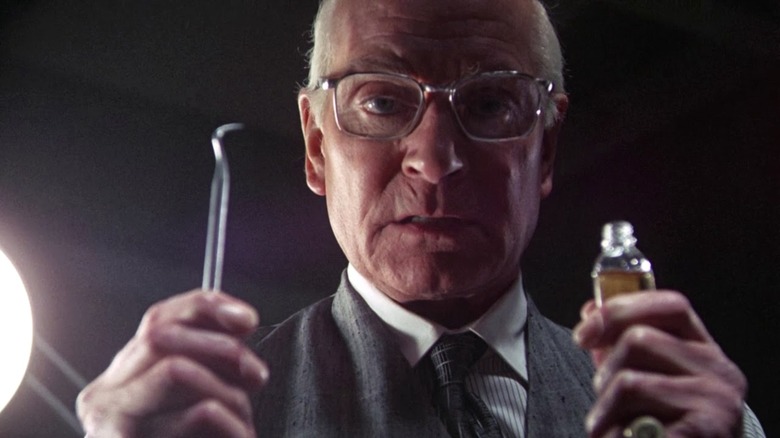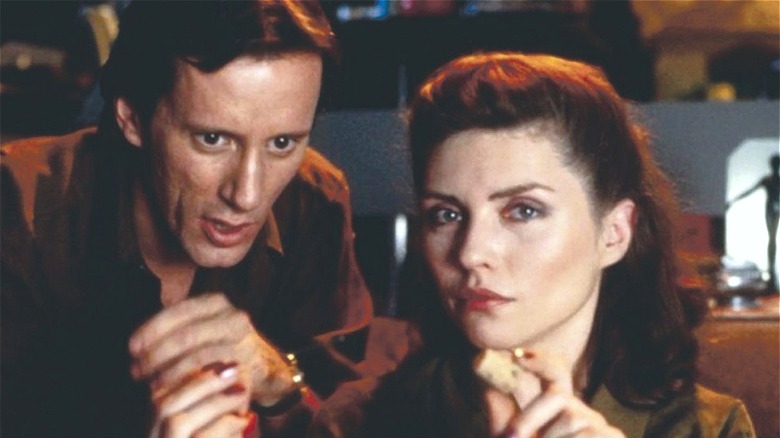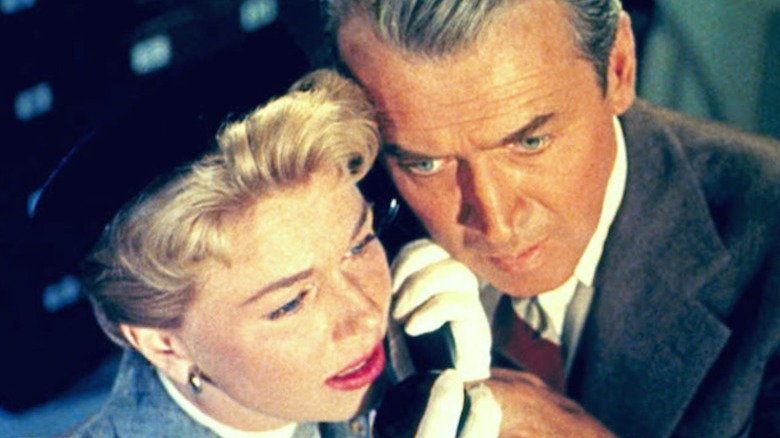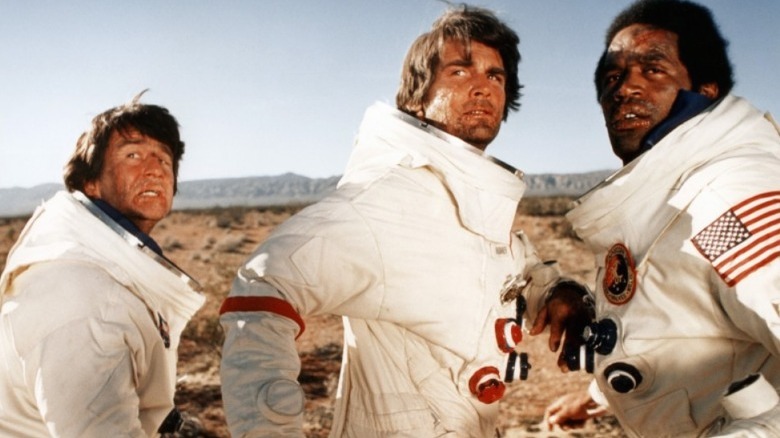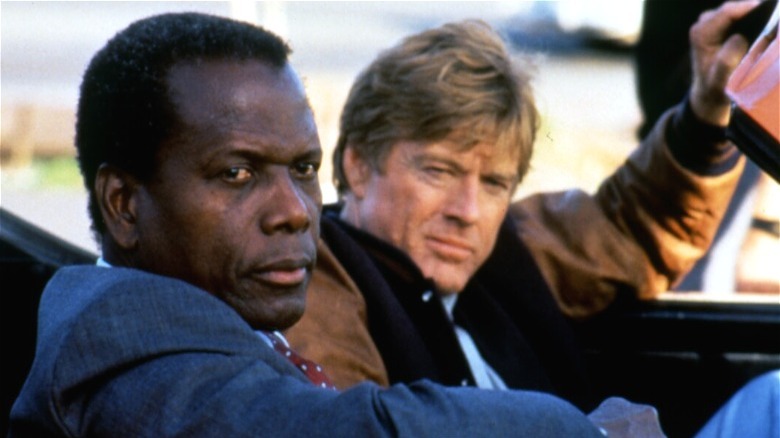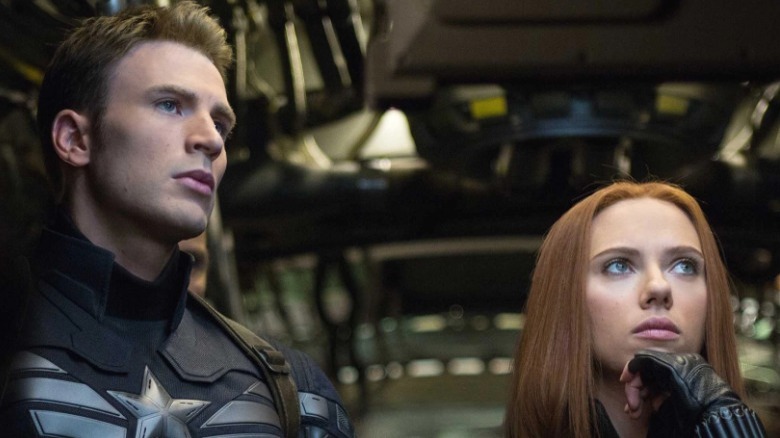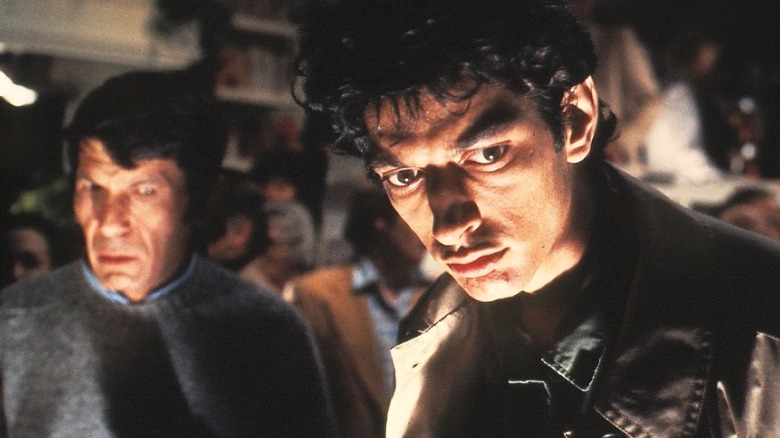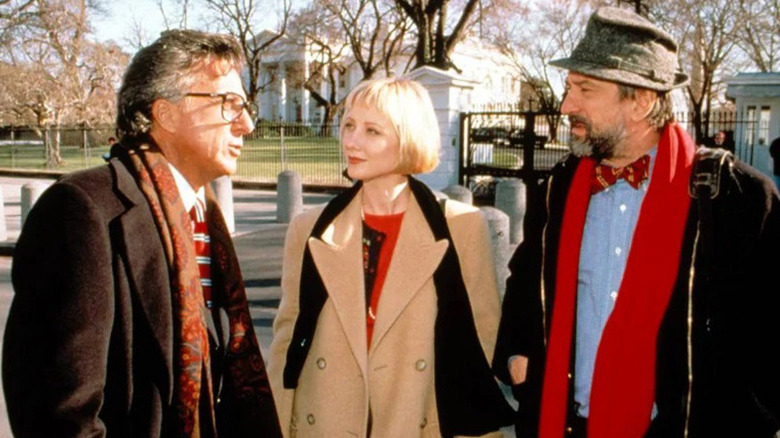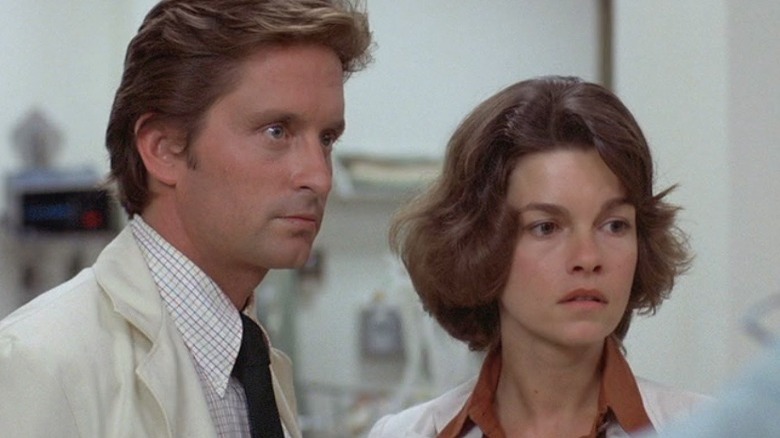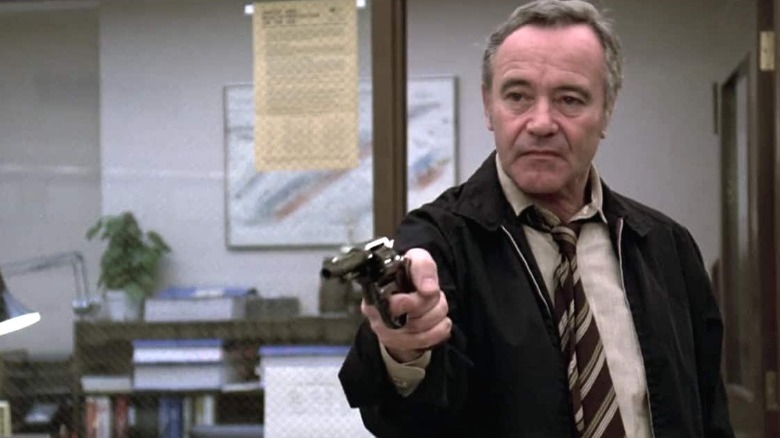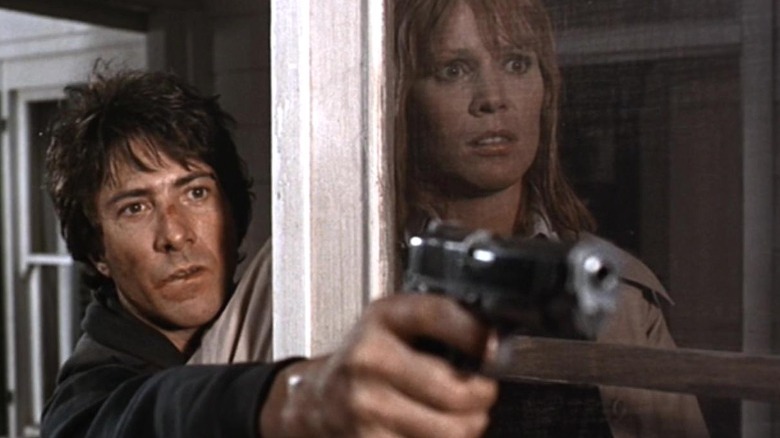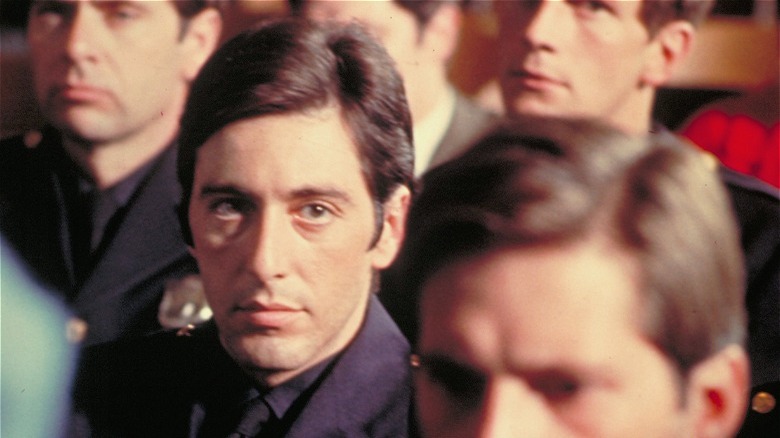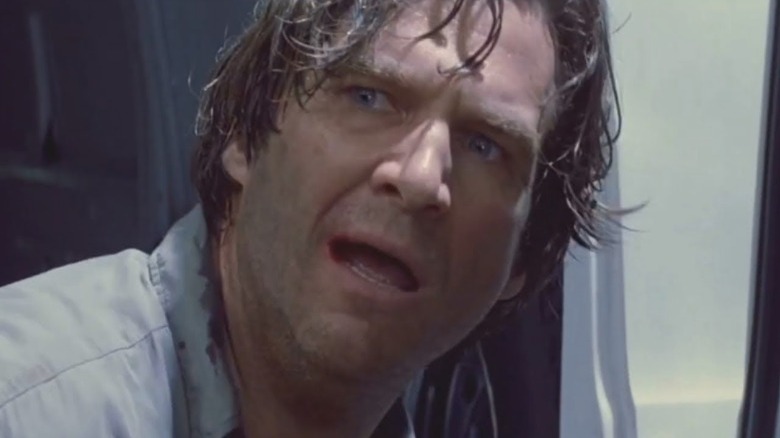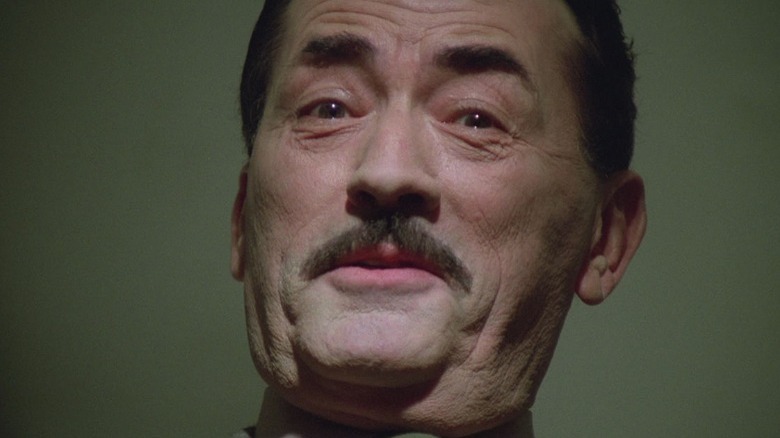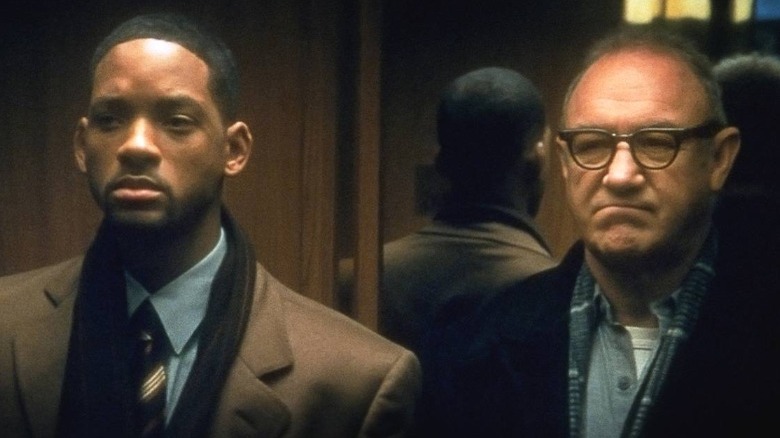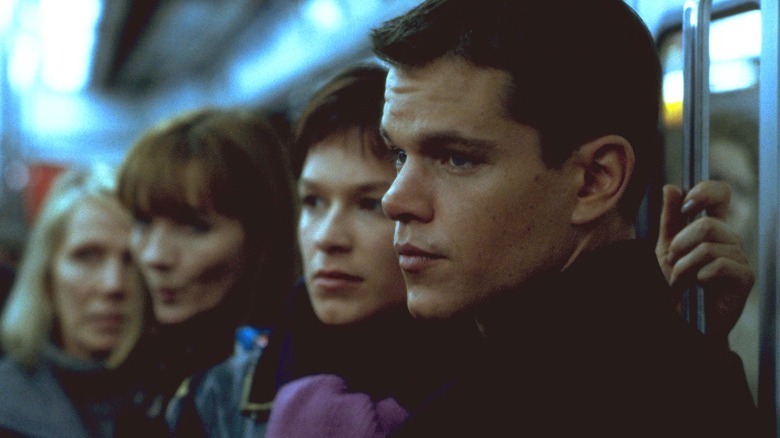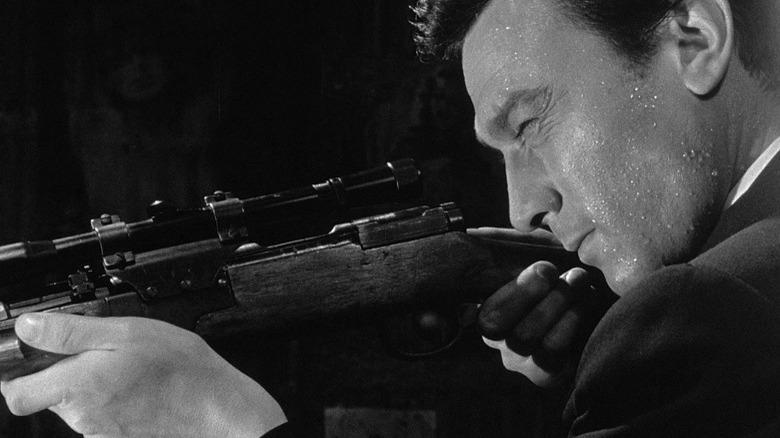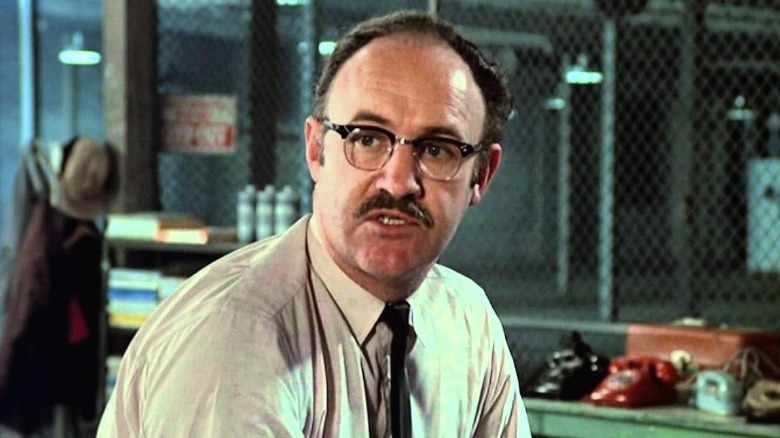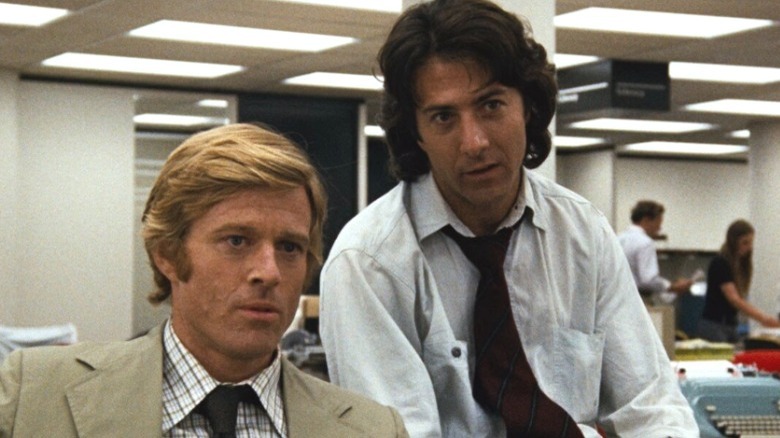The 18 Best Conspiracy Thrillers Ranked
The conspiracy thriller is a genre unto itself, but it overlaps well with a multitude of other genres. A thriller can be categorized as a straight-laced drama, sometimes complete with historical sources. It can be satirically funny, or it can contain elements of science fiction and horror. The best conspiracy thrillers of any subgenre mix plausibility and tension until the resulting anxiety becomes nearly unbearable. We fear for our protagonists, and we become scared of the potential behind the grander conspiracy.
Conspiracy thrillers can be a touchy genre sometimes. It's nearly impossible to avoid the politics behind some of the conspiracies within the biggest films in history. But it's that touchiness that makes film an important medium, able to explore the big questions of what's true and what's not. These 18 films are the best examples of how flexible the conspiracy thriller can be, and what they might have to say about the world around us.
18. Videodrome
In a way, horror is integral to the conspiracy thriller. Events have upended the only life our protagonists know, and the future is full of uncertainties. Director and writer David Cronenberg amps up the stakes in his body horror classic, "Videodrome." The movie starts humble enough: TV sleaze merchant Max Renn (James Woods) is hunting for the hottest viral footage he can air on his Canadian UHF station. When his techs pick up an unusually seductive piece of torture film, Max has no way of knowing where the trail of this video is going to lead him.
There's a ton to unpack about "Videodrome," but at its heart, the movie is about one man that gets way in over his head, falling into a world of government conspiracy. The goal is control over society's undesirable elements, and if control doesn't work, it'll cause a purge. Max becomes a catspaw between the two sides, and the results probably aren't what anyone expected. They sure are gross, though.
17. The Man Who Knew Too Much
Hailing from 1956 and improved in nearly every way from Alfred Hitchcock's own first attempt in the 1930s, "The Man Who Knew Too Much" is as charmingly out of date as "National Lampoon's European Vacation." Who can afford to travel overseas on vacation these days? Nonetheless, the plot is solid, and the twists are enjoyable. Ben and Jo, with their young son Hank, start their trip in Morocco where they make a new friend. Not long later, their new friend dies in Ben's arms, muttering to him the information he's been killed for: An assassination plot is already underway.
It's the lightest and most charming of Hitchcock's films, despite the whole political murder for global instability thing. Ben and Jo are driven by the love they have for their son, who becomes a hostage, but there's a rightfulness about them, too. It helps that they're played by James Stewart and Doris Day. Decades before Tom Clancy's "Patriot Games," this is a great film about ordinary people in extraordinary circumstances.
16. Capricorn One
Moon landing conspiracy theories were cute for a while. Everyone loves the joke that the Pentagon hired Stanley Kubrick to film a fake Apollo 11 moon landing, but Kubrick was known for insisting his projects were filmed on location. But these kinds of theories have a dark underbelly. They're about mistrusting everything around us, from the government to each other. 1977's "Capricorn One" dug around in that paranoia to create a pot-boiler classic. Instead of the moon, NASA is hoaxing up a Mars mission. The astronauts think they're in on it for the sake of American morale and government funding — until they're not.
Satirical and stressful, "Capricorn One" has some melodramatic flaws. Many of its would-be heroes aren't likable, and it's not clear what they're supposed to represent. Elliot Gould plays a reporter who tries to help the surviving astronauts, but he's an ambulance chaser who stumbles on one good story. The government's plot to permanently disappear its astronauts is ridiculous. But with a bizarre cast that includes Sam Waterston, O.J. Simpson, James Brolin (yes, Thanos' father), and more, it's a great, enjoyable example of how to explore our weirder theories in fiction.
15. Sneakers
It's not a true subgenre, but there's a class of film that puts aging and magnificent actors together so a good time can be had by all. Examples include "Grumpy Old Men" and "Space Cowboys," but the pinnacle of this odd genre is "Sneakers." Released in 1992, it's a sloppy New York pizza of a thriller, featuring actors like Robert Redford, Dan Akyroyd, and Sidney Poitier. The bad guy is played by Sir Ben Kingsley. Does all of the scenery get eaten? Yes, it does!
The plot is proper thriller fare, with governments clambering over each other to get their hands on the ultimate code-breaking software. But most of the infighting is seen from the ground-level view of a band of "sneakers," social engineers and old-school white hat (they're kinda gray, honestly) hackers who test a client's security measures. As comfortable a film as this is, there's still something to be said for the way it reminds us how fragile our privacy is, even before Facebook splattered all our secrets onto our public timelines.
14. Captain America: The Winter Soldier
It's fitting that the superhero series about a guy that's a living throwback gets to experience throwback genres, too. The heart of "Captain America: The Winter Soldier" is a Cold War-era movie about paranoia and exploitative militarization. It's not what anyone would call subtle about the topic, either, with Steve Rogers dropping hot banger quotes about SHIELD's current tactics like, "This isn't freedom. This is fear."
It's also simply natural that Marvel's on-point casting team got Robert Redford on board to play the genteel but untrustworthy Alexander Pierce. Redford's an old hand at paranoiac thrills, and his ability to successfully play against Nick Fury himself works because we know we can trust a Redford performance. Most MCU films fit into an additional subgenre, be it pulp science fiction or heist film. But "The Winter Soldier" feels less like a "Captain America" movie, and more like a familiar throwback to the conspiracy movie of old.
13. Invasion of the Body Snatchers
The 1978 version of "Invasion of the Body Snatchers" with Donald Sutherland and Leonard Nimoy is the definitive version, and we will not be taking questions at this time. Coming out of an unprecedented era of at-home paranoia, where we were told our enemies could be living right next door — and feeding off of the counterculture need for individualism — it's one of the most intense science fiction thrillers to exist.
Based on Jack Finney's 1950s novel (which is more cheerful than any of its direct adaptations), the film relies on building up our fear of one another. It goes about this with a political subtlety, comparable to movies like "The Thing." The replacement plot by the plant-like pod-people is almost benign in comparison. Nonetheless, while the aliens' goals aren't wholly clear, they've also made no plans to coexist with humanity. Yet, what that replacement will mean in the end isn't explained. It's a horrific idea to potentially wake up and be a new iteration of "you," your past humanity destroyed. But do you ever understand that you were different once?
12. Wag the Dog
Listen, you know how the last couple of years has felt like a fever dream? Not a one-off. 1997 was bizarre, with the satirical "Wag the Dog" telling a story about a couple of guys who make up a war to cover up an intimate scandal. Not one month later, the Bill Clinton scandal broke mainstream. Less than one year later, as impeachment hearings started, the administration bombed targets in Sudan and Afghanistan. Sometimes people think "Wag the Dog" is a fictional comedy about these events; it's not.
It's impossible to describe "Wag the Dog" without making it sound like a documentary. Dustin Hoffman and Robert De Niro play a movie producer and a political reputation fixer, respectively. When the president gets caught in the nookie, they whip up a fake war against Albania. There was already a real civil war happening in Albania at the time. The pair whip up even wilder scenarios to boost ratings, which is not at all a thing that keeps happening. Sometimes fiction is less absurd than reality. "Wag the Dog" went out of its way to be wild. It still feels mild today.
11. Coma
"Jaws" made swimming a tense experience for decades. Not long after, people who get nervous in hospitals had a hell of a time after the 1978 film "Coma." Based on a best-selling Robin Cook novel, the adaptation had fellow doctor-turned-novelist Michael Crichton in the director's seat. The premise is a haunting medical riff on the "Hotel California." You can check in for a routine medical procedure, but you'll never leave.
Geneviève Bujold plays a doctor who stumbles across a grisly scheme. Patients suffer surprise complications, go comatose, and are moved offsite to a special institute to study their condition. In truth, it's an illegal organ farm. The tension ratchets as the doctor and her boyfriend, Dr. Mark Bellows (Michael Douglas), discover how far the institute is willing to go to make a profit. Like "Jaws," it was never the intention of Crichton or Cook to make people terrified of a typically safe, real-life experience. However, organ donations declined by about half in 1978, something which at least one surgeon blamed on the film.
10. The China Syndrome
Two movies helped undermine the public's perception of nuclear power for decades: "The China Syndrome" in 1979 and "Silkwood" four years later. Of the two, the former is the better thriller, with Jane Fonda and Michael Douglas as a reporter and cameraman duo who begin to realize the local nuclear power plant isn't as stable as the plant's supervisor, Jack Godell (Jack Lemmon), would initially like them to believe. But Godell has his limits, and his willingness to whistleblow against the plant's increasing risk of a meltdown puts him in danger.
Wilford Brimley has a touching but small role as Lemmon's friend, a crucial character witness during the abrupt finale. The finale itself can be read one of two ways — a meaningful fade-out from an important news broadcast, or that Lemmon's last-ditch heroism didn't succeed, after all. Twelve days after "The China Syndrome" was released, Three Mile Island had its near meltdown. After all of this, despite increased safety and security, nuclear power in the U.S. is still a fledgling industry.
9. Marathon Man
Time to mention Dustin Hoffman and "Marathon Man," or, as we could title it, "How to Create a Lifetime Fear of Dentists With This One Neat Trick." Fun fact: Both the screenplay and the original novel for this story about a college kid at odds with a deadly war criminal are written by William Goldman, best known for his eternal feel-good story "The Princess Bride."
"Marathon Man" is not a feel-good story. Dustin Hoffman's brother in the film, Doc (Roy Scheider), is the secret handler of the Nazis. He is the thread of sanity holding together the horrific Dr. Szell as he's allowed to ply both his dentistry and his diamond trade in exchange for giving up other fugitive Nazis. When Szell flips his lid after Doc dies, Dustin eventually ends up in the guy's crosshairs. The film's most infamous scene involves a tooth drill and Szell (Sir Lawrence Olivier) tormenting Dustin with questions he can't possibly answer. Yikes.
8. Serpico
1973's thriller "Serpico" is a complicated story about police corruption. Adapted from Peter Maas' nonfiction novel about cop whistleblower Frank Serpico, it's not the pure truth about what happened to Frank in the years leading up to the night he was shot in the face in February 1971. But, passion comes off Al Pacino's version of Frank in waves, a plea for someone, anyone, to listen to what can happen when someone crosses the thin blue line.
The bulk of "Serpico" is told in flashback, memories streaming forward as Serpico lies in the street, near death and with backup failing to arrive. Over the years, Frank observes the way his fellow officers brutalize some of their suspects and the way they're fast to assume and abuse their own if they're suspected to be gay. He comes across further evidence of bribery and extortion, and records it all, dutifully reporting it up the chain, persuasively hoping someone will do their job. But no one does. The only good news? Frank Serpico survived his wounds all those years ago, and he's still calling out the cops.
7. Arlington Road
Did you enjoy being traumatized by "The Mist" and thought, "I want this exact sensation of creeping despair, but with Jeff Bridges?" Boy, have we got the movie recommendation for you! "Arlington Road" is a sucker-punch, a flick that walks a viewer through how attacks like the 1995 Oklahoma City bombing happen via lectures taught by Jeff Bridges' Michael Faraday, the movie's professorial lead. Then, it goes ahead and shows how a new one could be planned right in this dude's solidly middle-class neighborhood.
"Arlington Road" isn't a movie held together by rock-solid logic. Study its welds too long and you'll find the flaws. It's the emotional tethers that make this film a special study for conspiracy movie buffs. The fear is palpable as Bridges begins to suspect his nice neighbors, played by Tim Robbins and Joan Cusack, aren't what they seem to be. The resolution is one of the most daring moves in cinema, somewhere between bleak comedy and a shaggy dog story. The good news is, reality is rarely that deep. Your super annoying neighbors are just jerks, and probably not terrorists.
6. The Boys from Brazil
"The Boys from Brazil" is nearly unspoilerable by its place in the pop culture canon. Yes, it's the movie where they're trying to clone Adolf Hitler. Forget that it's supposed to be a surprise. The movie is sharp enough to rely on more than shock value. Smartly, Josef Mengele's plot doesn't only rely on genetics; he's also nurturing these kids by mimicking Hitler's own troubled childhood. The plot begins to come to light by chance, when a man overhears a table full of Nazis in South America and calls an old accomplice with his findings.
It's a hell of a thing to have a fictional version of the real-life Josef Mengele as our primary villain in "The Boys from Brazil." Weirder, Mengele is played by the gentle and genteel Gregory Peck, a man better known for his role as Atticus Finch than as one of history's greatest walking atrocities. On the bright side, the movie isn't shy about showing the audience Mengele's fate, and the film has a more hopeful ending than the bleaker Ira Levin novel it adapts.
5. Enemy of the State
"Ordinary dude caught up in dangerous political web" is such a reliable way to set up a thriller that the rest of the film needs to be fairly spectacular to rise above the pack. Fortunately, 1998's "Enemy of the State" has Will Smith in an early turn for the dramatic, and Gene Hackman in a screwball version of his role in Coppola's "The Conversation." In fact, there are a few details that allow a film fan to pretend this movie is a stealth sequel.
The NSA is one of America's lesser-understood intelligence agencies, and the film exploits its secrecy and not-so-great public perception for a thrill ride that'll make sure you never look at a street camera the same way again. It's the spiritual predecessor to today's prepper mindset, built on the grim canard that it's not paranoia if "they" really are out to get you. The mysterious "they" are out to get Smith's young lawyer, because he's unwittingly caught up in a conspiracy to empower the NSA far beyond its needs. It all feels a little too real today, a conspiracy that just might've won.
4. The Bourne Identity
"The Bourne Identity" is the new standard in conspiracy thrillers that tilt heavily towards the thrill-ride side of the spectrum. It's a twist for a franchise based on a 1980 novel by Robert Ludlum, making Bourne older than previous thriller standard protagonist Jack Ryan, who premiered in 1984. But the updates to Bourne's spy work are handled great; the relentless energy and charisma of Matt Damon make the first Bourne movie into a special experience.
Bourne is a man with no identity at first, no anchor to tell him who he really is. What he does have are reflexes and training, and enough drive to try to figure out why he seems to have come back from the dead. The answers come down to CIA infighting and a conspiracy centered around one of its grimmest black ops groups. Compelling enough to make Jason Bourne into a five-film franchise star, his future, while on pause, is probably not yet over.
3. The Manchurian Candidate
You don't need to have seen "The Manchurian Candidate" to understand the bonkers assassination plot inside "Zoolander," much less that one episode of "Star Trek: The Next Generation" where Romulans rewire Geordi La Forge. But it helps. It also makes Ben Stiller's riff even funnier.
1962's "The Manchurian Candidate" isn't funny at all. It's an intense, Cold War feature weighted with tragedy and interpersonal twists that would make O. Henry jealous. You probably know the gist: A war hero returns home, and gradually his friends realize he's been brainwashed into being the gunman for a high-level assassination plot. But that knowledge doesn't get across how fraught the whole film is, how awful the tension is not just for poor Shaw — the man who's had his mind wiped — but for his friends. They try everything to get their friend back and then have to commit to stopping him before he kills a presidential candidate. "The Manchurian Candidate" is one of the great conspiracy thrillers for a reason.
2. The Conversation
A controversial statement: "The Godfather" is not the best film Francis Ford Coppola has made. It's excellent, of course. But "The Conversation" is the watershed conspiracy movie, a piece of art so thoroughly prophetic in nature that it was conceived and completed before the Watergate incident. Yet, as Coppola remarks on the DVD commentary, echoes it right down to the wire-tapping techniques the real-life burglars used.
Gene Hackman plays Harry Caul, a man obsessed with his own privacy; ironic, considering his job is listening in to the private conversations of others. But, his recordings eventually pick up a conversation that wasn't intended for outside ears, and his ordered, secretive life is thrown into chaos. "The Conversation" is a small film that relies on its tightly wound cast, many of whom are Coppola regulars. It's also one of those rare but terrific John Cazale performances, here in the small but perfect role as the twitchy Stan, Hackman's only colleague and confidant. Finally, it's a must-watch, a masterpiece of everyday terror.
1. All the President's Men
If there's one film that exemplifies the modern-day conspiracy thriller, it's "All the President's Men," a fictional telling of the real-life hell Carl Bernstein and Bob Woodward went through while investigating the 1972 break-in at the Watergate hotel. Starring Dustin Hoffman and Robert Redford, respectively, the two reporters find their insignificant burglary turning into something far larger than they expected.
While fictional in some big respects, "All the President's Men" reminds viewers of the importance of dogged insistence on the truth. Journalism today has gone through some tough times, but we still need reporters like these. Hoffman and Redford have rare charisma; they're not perfect together, but clash in the right ways to add dynamic action to a film that doesn't have much. The secretive Deep Throat is played up for fictive effect, and the film is anticlimactic in some respects. The journalists didn't bring down Richard Nixon all by themselves, but this classic film shows why their struggle was crucial in making it happen.
